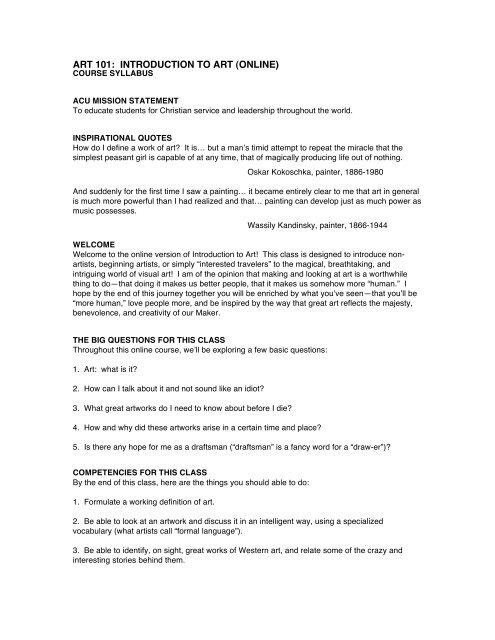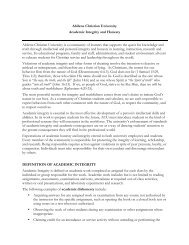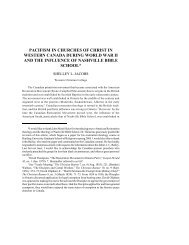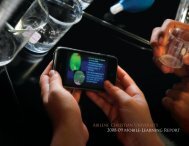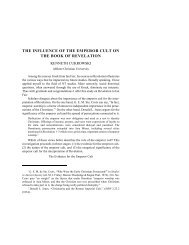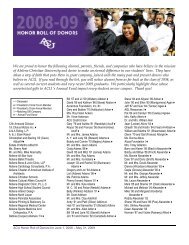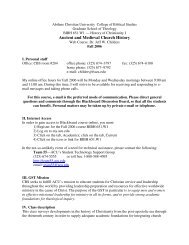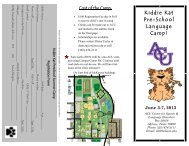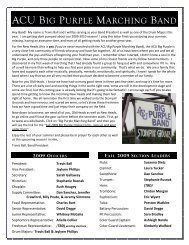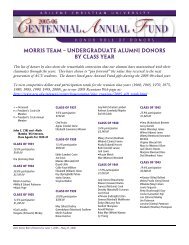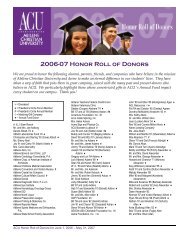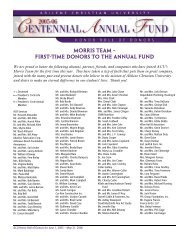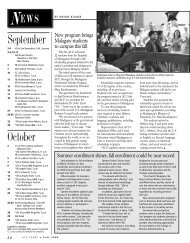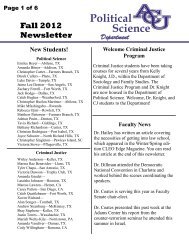Syllabus - Abilene Christian University
Syllabus - Abilene Christian University
Syllabus - Abilene Christian University
You also want an ePaper? Increase the reach of your titles
YUMPU automatically turns print PDFs into web optimized ePapers that Google loves.
ART 101: INTRODUCTION TO ART (ONLINE)<br />
COURSE SYLLABUS<br />
ACU MISSION STATEMENT<br />
To educate students for <strong>Christian</strong> service and leadership throughout the world.<br />
INSPIRATIONAL QUOTES<br />
How do I define a work of art? It is… but a manʼs timid attempt to repeat the miracle that the<br />
simplest peasant girl is capable of at any time, that of magically producing life out of nothing.<br />
Oskar Kokoschka, painter, 1886-1980<br />
And suddenly for the first time I saw a painting… it became entirely clear to me that art in general<br />
is much more powerful than I had realized and that… painting can develop just as much power as<br />
music possesses.<br />
Wassily Kandinsky, painter, 1866-1944<br />
WELCOME<br />
Welcome to the online version of Introduction to Art! This class is designed to introduce nonartists,<br />
beginning artists, or simply “interested travelers” to the magical, breathtaking, and<br />
intriguing world of visual art! I am of the opinion that making and looking at art is a worthwhile<br />
thing to do—that doing it makes us better people, that it makes us somehow more “human.” I<br />
hope by the end of this journey together you will be enriched by what youʼve seen—that youʼll be<br />
“more human,” love people more, and be inspired by the way that great art reflects the majesty,<br />
benevolence, and creativity of our Maker.<br />
THE BIG QUESTIONS FOR THIS CLASS<br />
Throughout this online course, weʼll be exploring a few basic questions:<br />
1. Art: what is it?<br />
2. How can I talk about it and not sound like an idiot?<br />
3. What great artworks do I need to know about before I die?<br />
4. How and why did these artworks arise in a certain time and place?<br />
5. Is there any hope for me as a draftsman (“draftsman” is a fancy word for a “draw-er”)?<br />
COMPETENCIES FOR THIS CLASS<br />
By the end of this class, here are the things you should able to do:<br />
1. Formulate a working definition of art.<br />
2. Be able to look at an artwork and discuss it in an intelligent way, using a specialized<br />
vocabulary (what artists call “formal language”).<br />
3. Be able to identify, on sight, great works of Western art, and relate some of the crazy and<br />
interesting stories behind them.
4. Be able to visit an art museum with authority, and not be intimidated by difficult, weird, or<br />
abstract art.<br />
5. Be able to draw and render (or “shade”) some really simple three-dimensional objects.<br />
NUDITY ALERT<br />
You should know that some (certainly not all) of the artworks in this course contain what I call<br />
“artistic nudity.” This means images (usually paintings and sculptures) of human figures without<br />
clothing.<br />
I personally think itʼs possible to be a committed <strong>Christian</strong> and look at images containing artistic<br />
nudity. I believe that this type of image celebrates the beauty of what God has made (as opposed<br />
to pornography, which degrades the body and turns it into an objectified tool to inspire lustful<br />
behavior).<br />
However, I also want to inspire chastity in my students (this is a rare enough virtue in todayʼs<br />
world, a rarity that makes it all the more important). Different things might cause different people<br />
to stumble. If you think that looking at artistic nudity will be spiritually problematic, this course<br />
may not be for you. Remember that your soul is more important than some college class.<br />
REQUIRED TEXT<br />
Living with Art, 9 th Edition (you can purchase the e-book, hard copy or both)<br />
REQUIRED SUPPLIES<br />
1. #2 pencil or set of drawing pencils<br />
2. Eraser<br />
3. Blank paper to draw on (printer paper is fine)<br />
4. Digital camera or scanner<br />
GRADING COMPONENTS AND COURSE POLICIES<br />
GRADE COMPOSITION<br />
E-Sketchbook 40%<br />
Conversation Café Posts 20%<br />
Quizzes 40%<br />
E-SKETCHBOOK<br />
Intro to Art is a course where in-class doodling is not penalized! Cool! Actually, I will walk you<br />
through several focused drawing assignments related to the subject matter for a given module.<br />
These will be submitted in your e-sketchbook. While you are not required to be a talented artist,<br />
you are expected to create work with your best effort that demonstrates that you “get” the<br />
assignment. Your work should show lots of time and effort, even if youʼre not a talented or trained<br />
artist. Donʼt worry if you canʼt draw a stick man—Iʼll help you, and itʼll be fun.<br />
That said, if your drawing looks like you slopped through it or werenʼt careful, you will not get<br />
credit for it. If the drawing you submitted is poorly photographed or your picture is blurry, you will<br />
be asked to resubmit it.<br />
Here is a general rubric for sketchbook grades:
A+ (100-95): Drawing or assignment not only meets all requirements, but exceeds expectations<br />
for quality. An above-and-beyond drawing. There is evidence of large amounts of committed<br />
time spent on the drawing.<br />
A/A- (94-90): Drawing fulfills requirements of sketchbook assignment, with strong quality. All<br />
goals of the assignment are met. It is evident that time and care were taken with the drawing,<br />
even if all aspects are not aesthetically perfect.<br />
B (89-80): Drawing fulfills most assignment requirements, but may have missed one or more<br />
important goals or characteristics. Quality is pretty good, but student could have been a bit more<br />
careful in execution.<br />
C (79-70): Drawing meets many requirements in a general way, but obviously lacks a degree of<br />
quality or time commitment.<br />
D (69-60): Drawing has major flaws in meeting the assignment requirements and/or appears to<br />
be hastily and carelessly executed.<br />
F (59 and below): Drawing does not meet assignment requirements, or is so sloppy as to not<br />
have earned a passing grade.<br />
CONVERSATION CAFE<br />
This is a gathering place for ideas, opinions, and reflections. Here you will submit written<br />
responses to prompts that relate to the moduleʼs subject. You are expected to spell-check and<br />
proofread your work, as well as to abide by the instructions for each prompt (length, relevance to<br />
prompt, etc.). Work that is poorly written (bad grammar, spelling, incoherent, etc.) will not receive<br />
credit.<br />
QUIZZES<br />
Most modules, or daily lessons, will conclude with a timed quiz. Be sure you have completed all<br />
activities for a module before taking the quiz; the questions are based on a combination of the<br />
podcast, reading, and sketchbook assignment. Note that due to the timed nature of the quiz, after<br />
you have answered a question and submitted it, you cannot go back. Do not hit the “back” arrow<br />
on your browser; it will lock up the quiz, and you will not get a grade!<br />
Keep in mind that you are responsible for finishing in this allotted time! You will receive a onequestionʼs-worth<br />
reduction from your grade for each minute or partial minute you exceed your<br />
time limit. This means that even if you're a few seconds over the total time limit, you will receive a<br />
grade reduction. Please take care!<br />
DUE DATES<br />
Each day of our class a new "course module" will be opened up. The official opening time for<br />
each module is 12:01 a.m. of that day (so, for example, Tuesday's module would be made<br />
available for you just after midnight on the night of Monday/Tuesday).<br />
All assignments for a day's module (quiz, sketchbook, reading, etc.) will be due by 8 a.m. the<br />
following day (going by <strong>Abilene</strong> time, not your local time if you're out of state!). This means that<br />
the module assignments made available on, for example, Tuesday would be due on Wednesday<br />
morning no later than 8 a.m.<br />
LATE WORK<br />
Late work will not be accepted, ever, at all, for any reason. A grade of zero will be given for<br />
any assignment or activity that is not submitted in time. Note that itʼs not enough to have your
assignment finished by the deadline; you must also have it submitted to the appropriate place on<br />
the Blackboard site in order to receive credit! I would recommend always double-checking to<br />
ensure that your assignments were posted successfully.<br />
Please note that technology problems (computer freezing, not having computer access<br />
because youʼre on a trip or vacation, forgetting your computer charger while youʼre away<br />
for the weekend) will not excuse you from assignment deadlines. It is your responsibility<br />
to make sure that your hardware and software are working effectively. You will need to<br />
make sure you have access to a working computer for the full duration of the course.<br />
WHAT IF MY.ACU OR BLACKBOARD IS DOWN?<br />
If, for some reason, you have technological trouble posting your assignment (if Blackboard is<br />
having problems or your file size is too large), it is your responsibility to e-mail your work to the<br />
instructor by the deadline—just send it as an attachment.<br />
WHOSE CLOCK DO WE GO BY?<br />
Assignment deadlines are dictated by the clock and calendar on the instructorʼs computer (U.S.<br />
Central Time, or the local time for <strong>Abilene</strong>, TX). Therefore, you might consider turning<br />
assignments in early to prevent misunderstandings or to avoid discrepancies between your clock<br />
and mine!<br />
ACADEMIC HONESTY<br />
While the overwhelming majority of students are completely honest, some will occasionally make<br />
poor ethical decisions. In this class, any form of cheating (submitting or copying someone elseʼs<br />
work, getting unauthorized help on an assignment or quiz, submitting the same project for two<br />
different classes, etc.) will result in an automatic 0 on the assignment and permanent-record<br />
documentation with the university for all perpetrators. Note that plagiarism is not limited to simply<br />
copying, verbatim, someone elseʼs work, but also includes copying someone elseʼs ideas.<br />
Cheating is a sin against God and an academic crime—please donʼt do it!<br />
For official university policy, see here:<br />
http://www.acu.edu/campusoffices/campuslife/acad_integrity.html<br />
BLACKBOARD<br />
Grades for this class will be posted on Blackboard.


